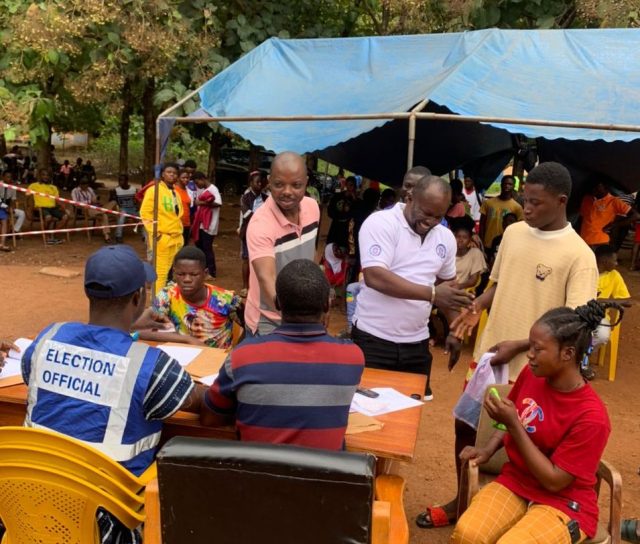In the 2020 elections, the Electoral Commission (EC) of Ghana committed the greatest crime conceivable in a constitutional democracy when citizens in four communities in the Volta Region (Santrokofi, Akpafu, Likpe and Lolobi, collectively called SALL) were denied their constitutional right to vote.
The disenfranchisement affected over 17,000 voters who, based on previous voting patterns, would have largely voted for the NDC. The denial enabled the NPP candidate to win the Hohoe parliamentary seat by about 5,000 votes.
That was a state-sponsored organized injustice against the citizens of SALL and the NDC.
That overt subversion of constitutional rights of citizens is discussed here to demonstrate that the balance of evidence is on the side of those who charge the EC with the subtle but grievous offense of voter suppression with respect to its actions around voter registration. The accusation is that the Jean Mensah-led EC has become an electoral instrument for the NPP.
Voter suppression involves the deployment of various strategies to reduce voting, or registration to vote, of targeted populations. It is often masked as legitimate acts of ensuring the integrity of the voting process. In the United States, the Democratic Party, not without warrant, has accused election officials in Republican controlled states of using voter suppression tactics to obstruct and prevent Democratic-leaning groups (racial minorities, immigrants, and younger adults) from voting. A textbook strategy of voter suppression is restricting voter registration (shortening registration periods, reducing voter registration centers, aggressive voter roll purging, and introduction of policies that require not-easy-to-acquire documents as proof of citizenship).
Intimidation by way of heavy presence of law enforcement personnel or self-appointed poll vigilantes is another tactic that is commonly used to suppress registration and voting.
Unlike the US where elections are overseen by state elected officials, in Ghana, the EC is an apolitical constitutional body from which electoral impartiality of the finest breed is expected.
But as soon as the Akufo-Addo government assumed office, it jettisoned conventions, norms, and processes sanctioned by the authority of the framers of our constitution and relied on bogus charges of malfeasance to haul out a cohort of duly appointed heads of the commission, replacing them with known NPP activists and sympathizers. The EC has since failed the test of neutrality.
And leading up to the 2020 elections, the Jean Mensah-led EC insisted on compiling a new voters’ register despite resistance from opposition political parties, civil society groups and policy institutes.
The chief reason the EC gave was that it wanted a credible and efficient voter register (a line of argument taken out of the voter suppression playbook). But the actual outcome of that exercise was the striking out of eligible voters in NDC strongholds.
During the exercise, there were widespread news reports that the inhabitants of the Volta Region felt intimidated and lived in fear owing to the unusual heavy presence of military personnel. It is therefore not surprising that, compared to the previous 2016 register, the Volta Region (Oti Region included) gained only 508 voters after the 2020 registration exercise was completed.
Conversely, the Central and Brong Ahafo regions, which are comparable to the Volta Region in terms of population, gained 160,085 and 148,316 voters respectively. Even the least populous region, the Upper West Region, added 54,730 voters. The only acceptable explanation for such an outlier would be that the Volta Region has a fertility rate similar to that of European countries.
A few months ago, the EC sent a constitutional instrument (CI) to parliament to make ID cards issued by the National Identification Authority, the so-called Ghana Card, the sole proof of eligibility to register to vote. There is credible evidence that it is relatively cumbersome to acquire the Ghana card in historically NDC learning areas. Passing the CI would have amounted to an act of voter suppression; the evidence lies in the number of people who have relied on the guarantor system compared to the Ghana Card in the ongoing limited voter registration exercise.
The most glaring voter suppression effort is the EC’s recent decision to limit the limited voter registration exercise to its district offices (268 centers) instead of the usual electoral areas (over 6,000 centers). This gives unfair advantage to the ruling party, with unrestrained access to state resources, to transport people from remote places in its strongholds to registration centers. Also, younger voters are more likely to vote for the opposition party than the incumbent; hence, making it difficult for those who turned 18 years to vote benefits the ruling party.
The right to vote is a fundamental democratic principle, a constitutive good of justice, and an entitlement that must be guaranteed to all irrespective of where they reside in the country.
The inviolability of the right to vote must be ensured by enhancing citizens’ capabilities through institutional arrangements and public policy to exercise it. That is the fundamental role of the EC.
The Secretary of NDC USA, Thomas Elleamo Yankey, is right on point when he argues in his recent article that the NDC and Ghanaians must resist any attempt by the ruling government, working collaboratively with the EC, to rig the upcoming 2024 elections.
Resisting such an attempt must be our call to duty!













